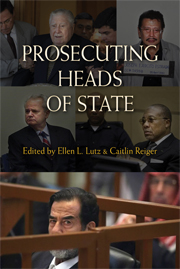Book contents
- Frontmatter
- Contents
- List of Contributors
- About the International Center for Transitional Justice
- Foreword
- Preface
- 1 Introduction
- 2 Prosecutions of Heads of State in Europe
- 3 Prosecutions of Heads of State in Latin America
- 4 The Multiple Prosecutions of Augusto Pinochet
- 5 A Leader Takes Flight: The Indictment of Alberto Fujimori
- 6 Charm and Punishment: How the Philippines' Leading Man Became Its Most Famous Prisoner
- 7 Shifting Legitimacy: The Trials of Frederick Chiluba
- 8 A Justice “Trickle-Down”: Rwanda's First Postgenocide President on Trial
- 9 Justice Squandered? The Trial of Slobodan Milošević
- 10 A Big Man in a Small Cell: Charles Taylor and the Special Court for Sierra Leone
- 11 Political Pedagogy, Baghdad Style: The Dujail Trial of Saddam Hussein
- 12 Conclusion
- APPENDIX: List of Prosecutions of Heads of State or Government since 1990
- Selected Bibliography
- Index
12 - Conclusion
Published online by Cambridge University Press: 06 August 2009
- Frontmatter
- Contents
- List of Contributors
- About the International Center for Transitional Justice
- Foreword
- Preface
- 1 Introduction
- 2 Prosecutions of Heads of State in Europe
- 3 Prosecutions of Heads of State in Latin America
- 4 The Multiple Prosecutions of Augusto Pinochet
- 5 A Leader Takes Flight: The Indictment of Alberto Fujimori
- 6 Charm and Punishment: How the Philippines' Leading Man Became Its Most Famous Prisoner
- 7 Shifting Legitimacy: The Trials of Frederick Chiluba
- 8 A Justice “Trickle-Down”: Rwanda's First Postgenocide President on Trial
- 9 Justice Squandered? The Trial of Slobodan Milošević
- 10 A Big Man in a Small Cell: Charles Taylor and the Special Court for Sierra Leone
- 11 Political Pedagogy, Baghdad Style: The Dujail Trial of Saddam Hussein
- 12 Conclusion
- APPENDIX: List of Prosecutions of Heads of State or Government since 1990
- Selected Bibliography
- Index
Summary
In December 2006, as the news filtered out about General Augusto Pinochet's death at the age of ninety-one in Chile, both his supporters and detractors took to the streets. Despite granting himself an amnesty when he stepped down from power, Pinochet spent the final years of his life under criminal investigation and indictment for massive human rights violations and corruption. His detractors lamented that he had gone to his grave without standing trial; his supporters cheered, “No le condenaron” – “They never got him.” Pinochet's case, like the others in this book, raises questions about the relationships between justice and power, justice and popular demands for accountability, and justice and societal change. Motivated by changes in international and domestic political willingness for holding former heads of state or government accountable, national judges increasingly have overturned amnesties and other legal impediments to prosecuting leaders for crimes committed on their watch.
The existing transitional justice literature that analyzes trials of those responsible for serious human rights or humanitarian law violations shows that trials have the potential for a strong positive impact on the rule of law in situations when a country is transitioning from an authoritarian regime to a democratic one, or from conflict to peace.
- Type
- Chapter
- Information
- Prosecuting Heads of State , pp. 275 - 294Publisher: Cambridge University PressPrint publication year: 2009



